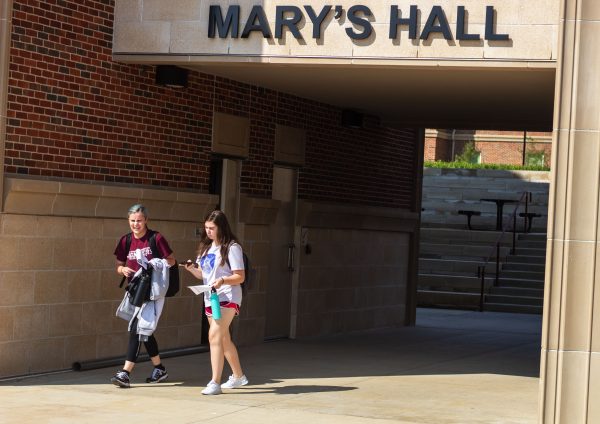Colleges need to lead the conversation
Emily Nickles, Editor-in-Chief
Something that is rarely discussed or addressed by college institutions across the United States is that college students are failing school because their personal health and interactions are failing. What I mean is that a majority of college students are depressed, and their schoolwork is suffering because those issues are not addressed. We just don’t seem to talk about it.
Now, I’m not blaming people for not getting help or choosing not to get help. It just might be a problem that people, based on beliefs about mental health, don’t take their mental health seriously. For example, in a research study led by Daniel Eisenberg titled “Attitudes and Beliefs About Treatment Among College Students With Untreated Mental Health Problems,” they found that 54 percent of college students who reported symptoms of a mental health disorder were not seeking treatment.
So why is that? After surveying a population of 13,105 college students, Eisenberg and his fellow researchers found that most students did not seek treatment despite positive views about getting help because, “They questioned the seriousness of their issues, preferred to handle the issues themselves, believed that their distress was a normal part of the college experience, or reported not having time for mental health services.” Essentially, college students don’t get help because they don’t know that they need help.
Right now, according to this research, it would take an intervention or an outside person stepping in to create a change for these students. Specifically, Eisenberg found that suggestions of getting help or “reframing” the option to seek help, had a positive impact — resulting in action steps. What students need is a proper education on what is “normal” and “abnormal” in regards to mental health. This would help students to realize why and when they need help.
National Alliance on Mental Illness did a study in 2012 surveying students who were previously diagnosed with a mental health disorder. Of the 765 respondents, 27 percent cited depression as their main diagnoses, and the other 72 percent of students were diagnosed with rarer conditions such as schizophrenia, bipolar disorder, anxiety, PTSD, ADHD and substance abuse. Even more telling was that 82 percent of respondents were female; women being two times likelier than men to experience depression in their lifetimes. Women are therefore more at risk than their male counterparts.
As a female college student, I can say with confidence that most of my friends, male and female, have experienced multiple seasons of extended depression, including myself. Depression and anxiety eat at students, along with the stress of classes, work and family life. Being a college student is like living with three different faces; you have to put a different face on depending on the situation. It’s an exhausting and disheartening task, and it seems never-ending. The hope that all students cling to is graduation and a better future. Without that goal to keep us going, I would bet that universities would find themselves losing students.
Mental health is something that needs to be talked about in order for us to understand it and get a hold on it. So let’s talk about it – let’s hold forums, ask questions and seek help. No one should have to be afraid of themselves or of being “abnormal.” We all go through struggles, and most everyone experiences depression, so we don’t have to be afraid going forward from here.
















Be First to Comment